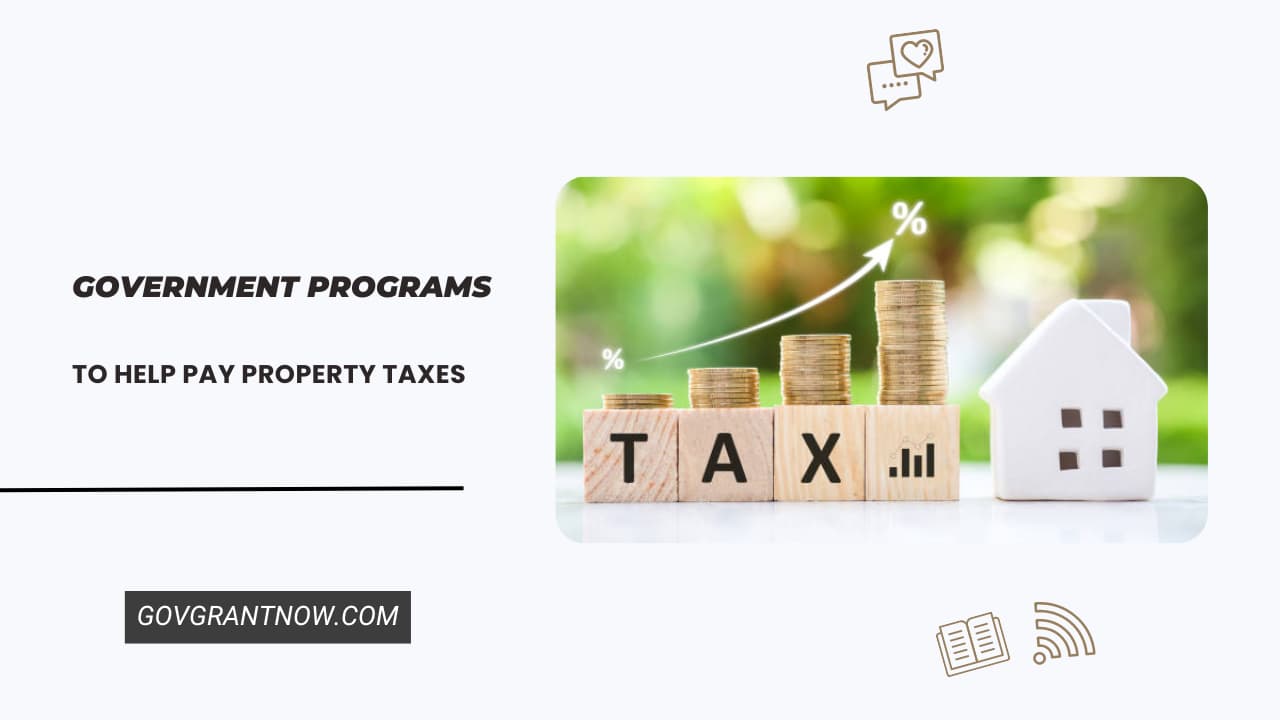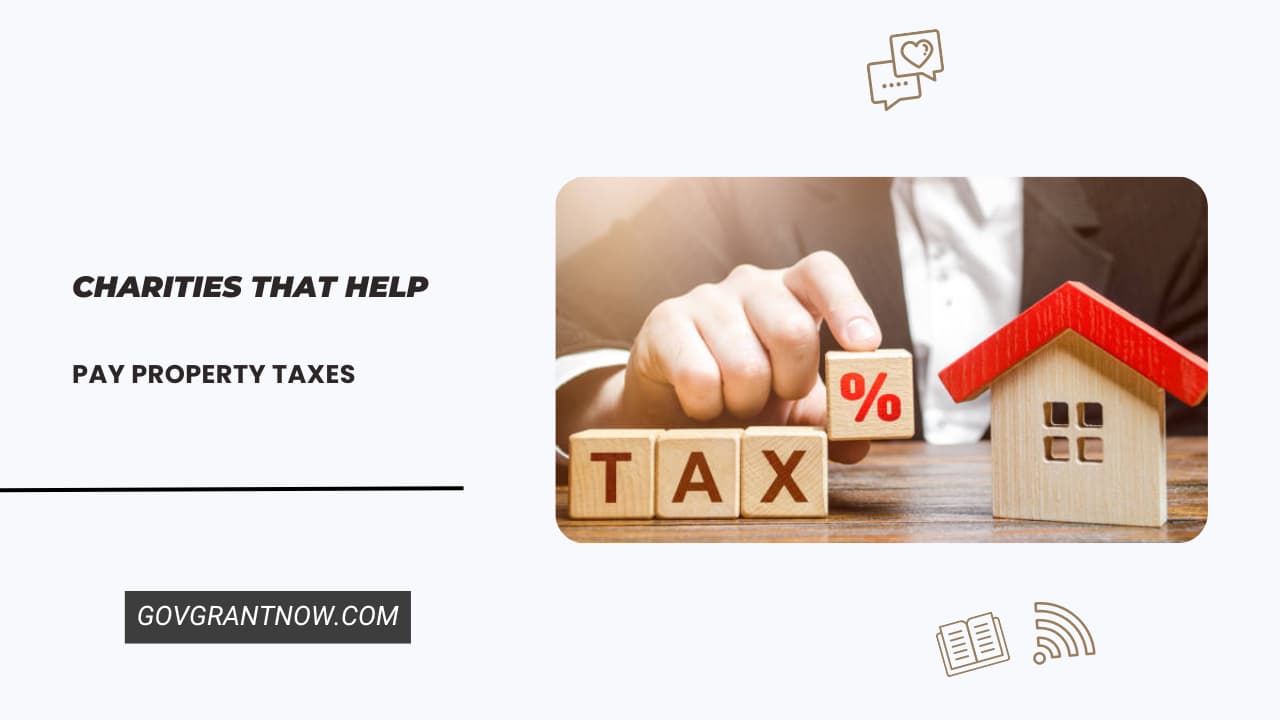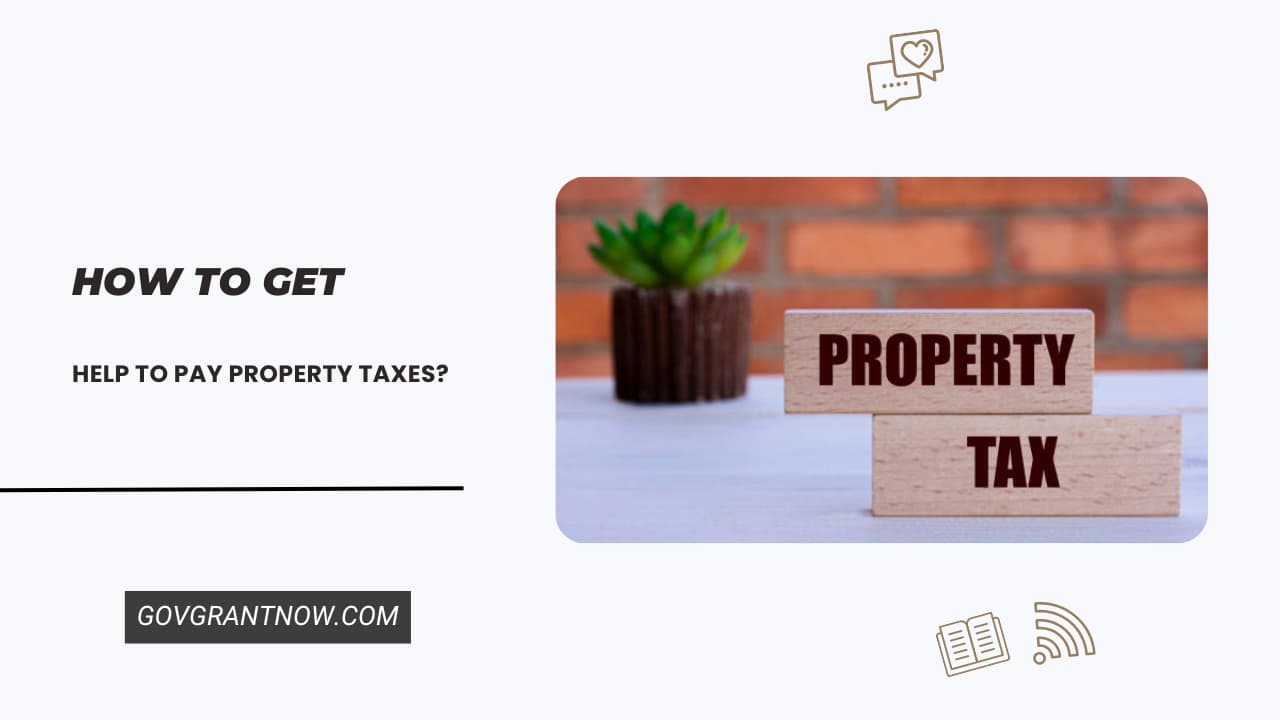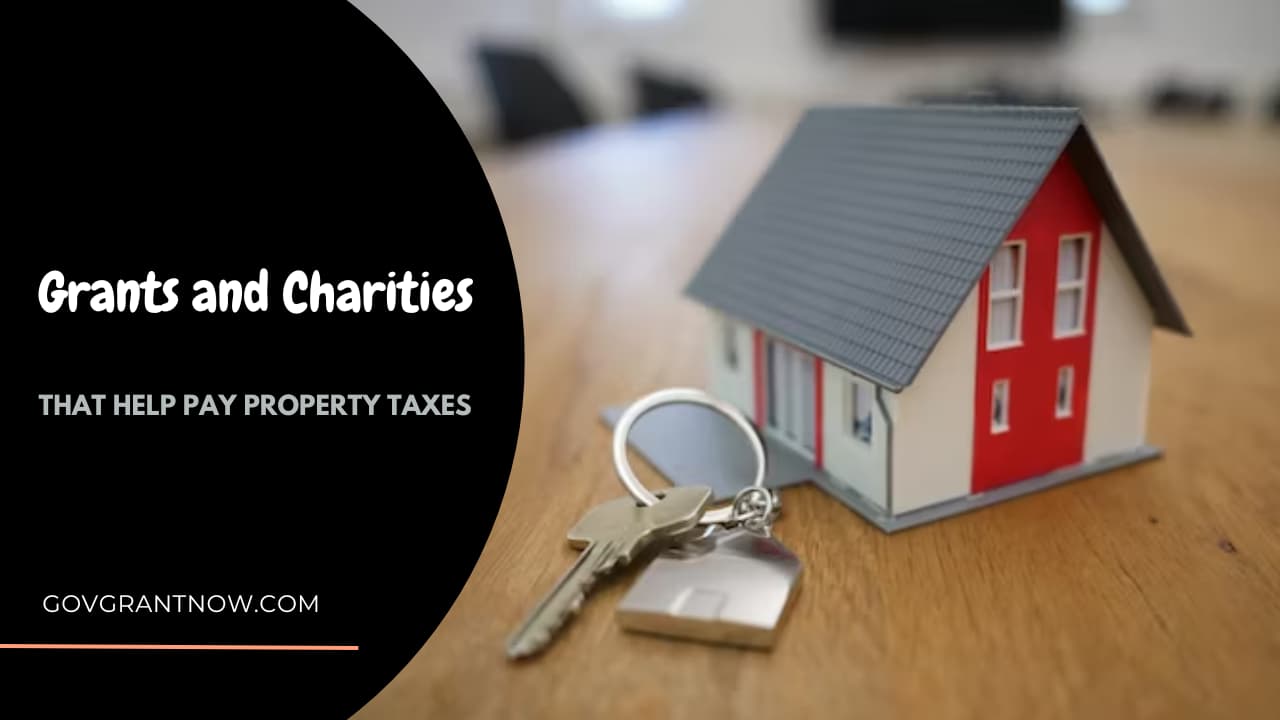Are you looking for help to pay property taxes? You have reached the right page. Property taxes may be expensive for low-income families. Property tax hikes may be distressing. Relief from this financial strain is possible.
This post will discuss the best programs and charities that help pay property taxes for low-income families.
We will also explain the consequences of not paying property taxes and provide simple instructions for requesting relief.
If you or someone you know struggles to pay property taxes and wants to maintain their home and finances, read on for simple solutions.
Table of Contents
Government Programs to Help Pay Property Taxes

There are many government programs that help with property taxes for low-income homeowners.
Generally, since property tax is levied by the state government, these relief programs are also offered by the state government.
Additionally, your county, municipality, and local area may also serve these programs.
As these programs are offered by the state government, the eligibility criteria for the program, application process, concession amount, etc. will be decided by the state government.
Some state governments may also offer grants to help pay property taxes, while some may waive your property taxes in full or some percentage.
You should check these programs on your state government’s website to get help with property taxes.
Here are some government programs that property tax help for low-income homeowners:
1. Homestead Exemptions
The homestead exemption is a legal provision offered by most American states that protects the value of residents’ homes from property taxes, creditors, and circumstances arising from the death of the homeowner’s spouse.
This tax exemption provides both physical shelter and financial protection so that homeowners can prevent their primary residence from being forced to sell.
Some homestead exemptions provide a fixed amount of relief from the entire taxable value of your home, while others are calculated based on a percentage of property taxes.
Since the homestead property tax exemption targets the primary residence of an individual, no exemption can be claimed on other owned property, and residences as well.
Additionally, if the surviving spouse moves to their primary residence, they must reapply for the exemption.
Second, if the homeowner defaults on their mortgage, the homestead exemption cannot prevent or close the bank foreclosure.
Since homestead tax exemptions are offered by states, each state’s eligibility criteria and exemption amounts vary from state to state.
So you should check your state government website to know the information about it.
Homestead tax exemptions typically offer a fixed discount on your property taxes, plus allow the balance to be paid off with taxes at the normal rate.
For example, if you receive the $50,000 homestead exemption, you will only be taxed on $25,000 of assessed value on a home valued at $ 75,000.
2. Senior Citizen And Disabled Person Exemptions
If you are a senior citizen or a disabled person and have a primary residence, you will be happy to know that many state governments offer property tax relief for senior citizens and disabled persons.
There may be age and income requirements for senior citizens and persons with disabilities to qualify for property tax exemptions, which vary from state to state.
In addition, you must submit documents that meet age or disability, ownership, residency, and income requirements to prove eligibility.
This program reduces the amount of property tax owed to qualified individuals.
You should check the state government website to know how much property tax relief your state government can give you as a senior citizen or a disabled person.
3. Veterans Exemptions
The good news for veterans is that many state governments offer property tax relief for veterans, disabled veterans, or their surviving spouses.
Veterans may be eligible for this tax exemption for their primary residence.
Eligibility and exemption amounts generally depend on their disability rating, state, county, and city.
Some state governments offer full property tax exemptions to veterans with disabilities or those over age 65, while others offer relief based on a fixed value or percentage of property taxes.
Check the veteransunited website to find out Veteran property tax exemptions by state and the eligibility criteria.
4. Income-Based Property Tax Relief
Income-based property tax relief specifically provides property tax relief to low- and moderate-income homeowners.
Families who are burdened with property tax bills can avail of this relief program.
The benefit of this program is that it provides tax relief to both needy landlords and tenants.
Homeowners may be capable of staying in their homes through this program.
In addition, qualified individuals can save their after-tax income, spending it on other needs.
Generally, since this property tax relief is funded by the state, the eligibility criteria and the relief value are decided by the state government.
You should check the state government website to know the eligibility criteria for income-based property tax relief and the property tax relief amount.
Related Post : Government Assistance for Car Repairs
5. Property Tax Freeze Programs
Property Tax Freeze Programs allow senior citizens or individuals with disabilities to freeze their property tax values at a certain level, preventing increases caused by rising property values.
Homeowners who qualify for this program can freeze property taxes on their primary residence at the original tax amount.
Thereafter, as long as the homeowner continues to qualify for the program, the amount of property taxes owed will generally remain constant and will not change.
The tax freeze program is only available to a qualifying homeowner’s primary residence located in a participating county or city.
Eligibility for this program takes into account age, disability, and county income limits, which vary from state to state.
Check the state government website to find out if your state offers Property Tax Freeze Programs and if so, the eligibility criteria for them.
6. Property Tax Rebates Programs
The Property Tax Rebate Program provides financial assistance by providing property tax refunds to homeowners who have already paid their property taxes.
It is also often called the Property Tax Relief Program or Property Tax Rebate Initiative. Usually, these programs are implemented at the state or local level.
In some cases, state governments use property tax rebate programs to support the economic activity of property owners.
However, since this rebate program is administered at the state or local level, program eligibility criteria, application procedures, and rebate amounts may vary from program to program and region to region.
Some property tax rebate programs will reduce a percentage of the property’s tax bill, while others will provide financial assistance by check or credit to eligible homeowners.
Check your state government’s website to find out if your state or locality offers a property tax rebate program.
7. Good Neighbour Next Door Program
The Good Neighbor Next Door Program allows law enforcement, pre-K-12th-grade teachers, firefighters, and emergency medical technicians (EMTs) to purchase homes in a revitalized area at 50% off market value if they agree to live there for at least 36 months.
The program, offered by the US Department of Housing and Urban Development, designates revitalization areas based on neighborhood household income, homeownership rates, and FHA-insured mortgage activity.
In addition, the program provides a discount on the purchase of HUD-owned homes, and Good Neighbor Next Door buyers who qualify for an FHA-insured mortgage are eligible for a down payment of at least $100 instead of the standard 3.5 percent of the property’s adjusted value.
8. Home Affordable Modification Program (HAMP)
The Home Affordable Modification Program (HAMP) was a loan modification program introduced by the federal government in 2009 to help struggling homeowners avoid foreclosure.
The program works by encouraging participating mortgage servicers to modify mortgages so that struggling homeowners can make lower monthly payments.
Although HAMP had a specific deadline and was set to expire in December 2016, it was often extended.
While the federal government no longer accepts applications for HAMP, there are many other programs that help struggling homeowners pay property taxes, such as loan modification programs offered by individual lenders, state-level assistance programs, or other federal initiatives.
If you want assistance in paying property taxes, you can contact mortgage servicers who can help you find the best solution for paying taxes.
Related Post : Government Grants for Roof Replacement
Charities that Help Pay Property Taxes

As you know charities are always ready to help the needy. Some of these charities help low-income people, seniors, the disabled, veterans, and other families in need pay property taxes.
Charitable organizations provide advice to needy people to reduce property taxes, and can also provide financial assistance for immediate needs.
You can get help paying your property taxes and take steps to reduce your property taxes in the future by contacting these charities.
Here are some charities that help pay property taxes:
The Homeownership Preservation Foundation
The Homeownership Preservation Foundation (HPF) provides free housing counseling to help homeowners avoid foreclosure and other financial problems as a charity.
They help homeowners with unpaid property taxes by offering payment plans, loan modifications, and other financial relief.
The charity provides basic financial advice and education to help homeowners manage their money and secure their financial future.
Since 2004, the group has helped nearly 9 million homeowners with housing and financing.
If you too are planning for the long term to help pay your property taxes or need immediate help, you can visit their website at 995hope.org or call 888-995-4673.
St. Vincent De Paul
St. Vincent de Paul also helps pay property taxes, among other things.
They offer many different programs and services including emergency financial assistance, housing assistance, and food assistance.
Working through a network of St. Vincent de Paul local councils across the United States, you can contact them for help paying property taxes.
St. Vincent de Paul helps people experiencing poverty. Each request for assistance is examined individually and unique programs help individuals and families heal.
The National Council on Aging (NCOA)
Another nonprofit charity, the National Council on Aging (NCOA), improves the lives of seniors through a number of programs and services.
Founded in 1950, the charity has helped millions of seniors by providing advice on healthcare, retirement, and financial planning.
The National Council on Aging (NCOA) offers a benefit check tool to help seniors find and apply for property tax relief programs.
Their counseling team offers solutions to many problems, such as how to reduce my property taxes, and where to go for free or low-cost legal services, etc.
The American Legion
The American Legion, founded in 1919, is the largest nonprofit organization of US military veterans.
Their volunteers raise millions of dollars to support charities that provide services and support to military members, veterans, and their families.
Some local groups can help with property taxes or other housing obligations, but this requires research.
The American Legion advocates for the interests of veterans and provides job placement, tuition assistance, and medical care.
The organization also administers a national emergency fund for veterans and their families.
Related Post : Charities That Help the Homeless with Housing
Modest Needs
This organization helps those in financial difficulty to pay property taxes when needed. Modest Needs can help you find donors who can temporarily help with rent, mortgage, and utility bills, among other expenses.
Donations to modest needs crowdfunding projects can help address specific needs.
The organization helps people who are financially stable but need more low-income for government assistance.
Each application is reviewed, and money is distributed so that beneficiaries can maintain their self-sufficiency.
The United Way
The United Way is another charity that helps pay property taxes for low-income homeowners.
This foundation helps needy families across the country. Some local groups can help with property taxes or other housing assistance, but this requires coordination.
United Way partners with regional organizations and NGOs to help communities nationwide. They discuss education, money, and health.
The organization operates a 2-1-1 helpline to connect those in need with local information and services.
The VFW Foundation
VFW Foundation serves military veterans, service members, and their families by securing resources for programs that facilitate enhanced life outcomes.
They provide financial aid, academic scholarships, and mental health treatment.
Veterans, service members, and their families can contact VFW Charities for property tax or other housing assistance.
Their Unmet Needs program provides financial assistance up to $2,500 in grants to help America’s active-duty service members and their families, which they can spend on property taxes or other needs.
Disabled American Veterans (DAV)
Disabled American Veterans (DAV) charity supports disabled veterans and their families.
DAV encourages disabled veterans and their families by helping them with any type of assistance they may need.
DAV is ready to provide lifelong support to veterans and their families, that too at no cost.
Disabled American veterans can contact them for property tax or other housing assistance.
DAV promotes the rights of wounded veterans, helping them find jobs, explain their benefits, and get them where they need to go.
The group’s nationwide service program helps veterans and their families benefit.
Related Post : Churches That Help with Car Repairs Assistance
How to Get Help to Pay Property Taxes?

If you cannot afford your property tax then you can get help to pay property tax by following the steps given here:
Step 1: Finding and Requesting Property Tax Relief
There are many ways to get help paying house taxes for every homeowner. The following information and suggestions may help you start:
Step 2: Ask Neighbourhood Nonprofits:
Many local organizations and nonprofits help low-income homeowners in paying property taxes. Habitat for Humanity, churches, and community centers may help.
Step 3: Check National Initiatives:
Several government programs help in paying property taxes for qualified applicants. The National Council on Aging will help you find local property tax assistance programs.
A list of eligible programs will appear after entering your zip code and choosing the desired benefits (property tax relief).
Step 4: Look into Public Assistance:
Property tax relief schemes from state and municipal governments benefit low-income homeowners. Contact your state’s tax department or visit their website to see whether you qualify for programs.
Step 5: Prepare the Paperwork:
You may need proof of income, property ownership, and tax assessment to qualify for property tax reduction. Prepare supporting documents before applying.
Step 6: Apply for Property Tax Relief:
You may apply after finding groups that provide property tax relief and gathering the documentation. You need to follow the company’s deadlines and processes.
Step 7: Take Follow Up:
After submitting your application, follow up with the organization to confirm receipt. Follow up if your application has not been heard from after a while.
Property tax relief may not be offered to everyone, and funding may be restricted. It would be best if you investigated alternative financial help options.
Related Post : Grants for Windows and Doors from Government
Things to Keep in Mind While Accepting Property Tax Relief
Property tax relief can save financially strapped families, but it’s important to weigh the pros and cons before making a decision. Some examples are given here:
Increased Verification from Tax Authorities:
Property tax relief may prompt a closer look at your finances and tax returns. This may result in a time-consuming and unpleasant audit or investigation.
Aid Limit:
Lack of cash or program eligibility may prevent some homeowners from receiving property tax help. This means your assistance application may be declined due to inadequate cash.
Credit Rating Impact:
Any assistance may harm your credit score. For instance, borrowing money to pay property taxes might lower your credit score and incur late fines.
Don’t Hesitate to Ask for Help:
Some homeowners wanting to seem financially independent may view property tax help as a sign of weakness. When you are battling to overcome this emotional hurdle, remember that asking for help is okay.
Related Post : Getting Free Baby Stuff and Samples for Your Baby
What Happens If You Don’t Pay Property Taxes?
Real estate taxes must be paid. If you don’t pay, harsh consequences await. Nonpayment may incur instant consequences.
If you have not paid in a fair period, the local tax authority may auction your property to cover unpaid taxes, penalties, and interest.
What Can I Do If I Don’t Get Help Paying Property Taxes?
Consider alternative tax management options if you can’t negotiate a property tax decrease. You may lower your cost of living by spending less or changing your lifestyle.
If you are broke, consider working two jobs. Selling your home may be your last recourse after exploring all other possibilities, such as moving to a lower-tax location or buying a tax-break property.
Suggested Post :-
Conclusion:-
We have provided information on many property tax assistance to families struggling with property taxes in this guide.
We’ve included information about charities and government programs and helpful tips for applying to help people pay their property taxes.
You can prevent your family from becoming homeless and secure a home with the help of these programs and charities.
Remember that property tax relief can help reduce the financial burden. Take advantage of these opportunities, secure your family’s financial future, and rest in a safe home.
Frequently Asked Questions:
How Can I Get Help Paying My Property Taxes?
There are many government programs and charities that help needy individuals pay property taxes. You can get help paying property taxes by applying to these programs or contacting charities.
What Can I Do If I Need Help Paying My Property Taxes?
If you need help paying property taxes, you can apply to some government programs. These programs are offered by state governments that provide relief on your property taxes. Here are some such programs:
- Homestead Exemptions
- Senior Citizen And Disabled Person Exemptions
- Veterans Exemptions
- Income-Based Property Tax Relief
- Property Tax Freeze Programs
- Property Tax Rebates Programs
- Good Neighbour Next Door Program
- Home Affordable Modification Program (HAMP)
How Can I Get Help Paying House Taxes?
There are many charities that can offer advice on reducing your house tax and also provide financial assistance to needy families. You can get help paying house taxes by contacting the following charities:
- The Homeownership Preservation Foundation
- St. Vincent De Paul
- The National Council on Aging (NCOA)
- The American Legion
- Modest Needs
- The United Way
- The VFW Foundation
- Disabled American Veterans (DAV)
What Factors Determine My Property Tax Bill?
Your home’s assessed value and local tax rate affect your property tax bill. Additionally, the size, location, and quality of property improvements can also affect your property tax bill.
Is the Property Tax Relief Available Only for Landlords or for Tenants as Well?
If landlords incorporate property tax reductions in their rental prices, renters may indirectly benefit. Most direct help programs target homeowners.
Is Property Tax Assistance Taxable?
Financial help for property taxes is seldom taxable. Consult a tax professional or social services agency to see how this may impact your other benefits.
What Is the Average Response Time for Property Tax Relief Requests?
Processing time for property tax relief applications may vary. That’s because property tax relief programs are run independently by each state, and each has its own eligibility criteria and application process that varies from area to area. Additionally, how long your state government takes to process the application, how much relief will be available, and where you live all factor in.
